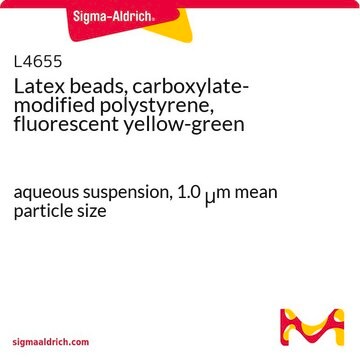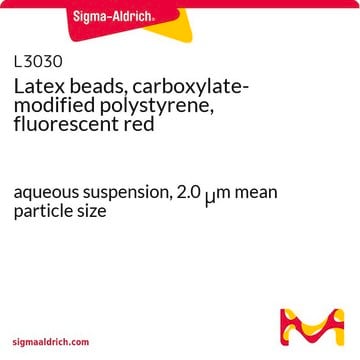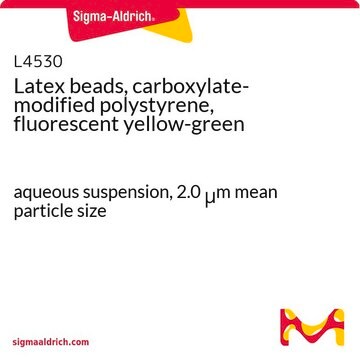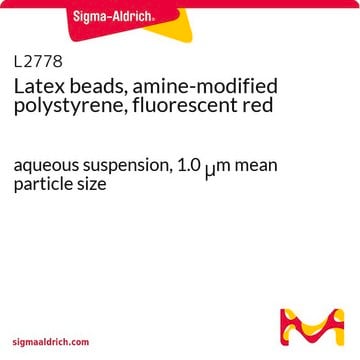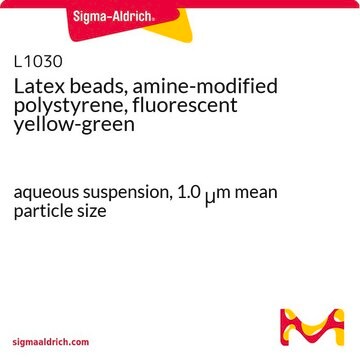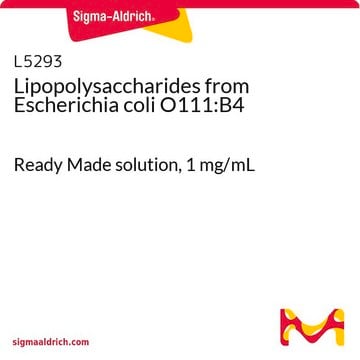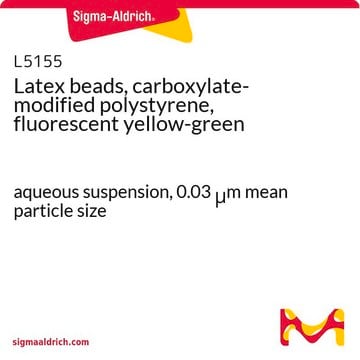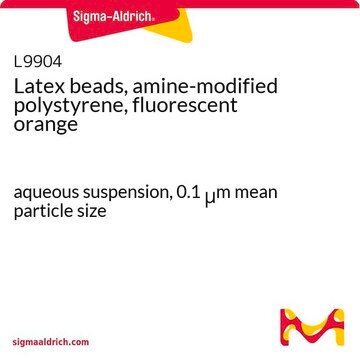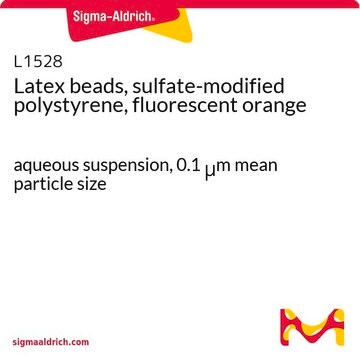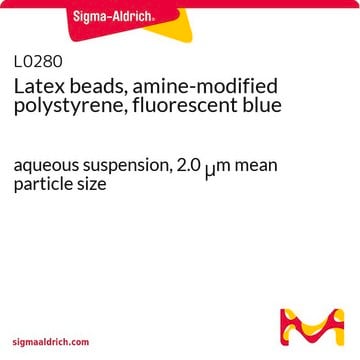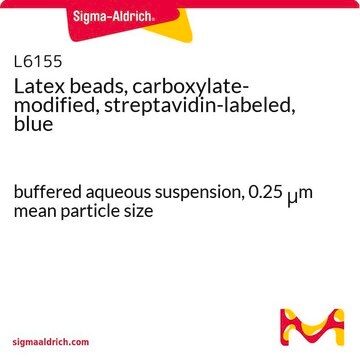L3280
Latex beads, carboxylate-modified polystyrene, fluorescent red
aqueous suspension, 0.5 μm mean particle size
Synonym(s):
Carboxylate Polystyrene Beads, Fluorescent Latex Beads
Sign Into View Organizational & Contract Pricing
All Photos(1)
About This Item
Recommended Products
form
aqueous suspension
Quality Level
composition
Solids, 2.5%
technique(s)
cell based assay: suitable
mean particle size
0.5 μm
fluorescence
λex ~575 nm; λem ~610 nm
application(s)
cell analysis
Looking for similar products? Visit Product Comparison Guide
Application
Carboxylate-modified polystyrene latex beads have been used to collect morphofunctional data about the immune systems of Carabus lefebvrei, a helicophagous Italian endemic ground beetle often used as an indicator of the habitat quality of the Apennines mountain forests. Carboxylate-modified polystyrene latex beads have also been used to inform comparative studies on immunity defense mechanisms of adults and larvae of the coleopteran Cetonischema aeruginosa and to investigate the phagocytic activity of cultured rat thyroid cells.
Latex beads, carboxylate-modified polystyrene, fluorescent red has been used:
- along with Milli-Q for fluid dynamic studies
- along with bile salts for confocal studies
- for particle encapsulation
Storage Class Code
10 - Combustible liquids
WGK
WGK 3
Flash Point(F)
Not applicable
Flash Point(C)
Not applicable
Personal Protective Equipment
dust mask type N95 (US), Eyeshields, Gloves
Choose from one of the most recent versions:
Already Own This Product?
Find documentation for the products that you have recently purchased in the Document Library.
Customers Also Viewed
Gina Greco et al.
Sensors (Basel, Switzerland), 17(11) (2017-10-27)
Surface chemical and biochemical functionalization is a fundamental process that is widely applied in many fields to add new functions, features, or capabilities to a material's surface. Here, we demonstrate that surface acoustic waves (SAWs) can enhance the chemical functionalization
Edwin J A Veldhuizen et al.
Protein and peptide letters, 24(7), 609-616 (2017-05-04)
The Porcine Myeloid Antibacterial Peptide (PMAP)-23 is a porcine host defence peptide with strong antibacterial activity against Gram-positive and Gram-negative bacteria, and fungi. PMAP-23 and truncated/mutated derivatives were tested for antibacterial and immunomodulatory activities to determine core elements of the
Yuqing Huang et al.
Genes, 12(8) (2021-08-28)
The nematode Caenorhabditis elegans has been a versatile model for understanding the molecular responses to abiotic stress and pathogens. In particular, the response to heat stress and virus infection has been studied in detail. The Orsay virus (OrV) is a
Xing X Du et al.
Liver international : official journal of the International Association for the Study of the Liver, 38(2), 229-238 (2017-06-24)
Patients with acute-on-chronic liver failure (ACLF) usually exhibit defective monocyte function and excessive systemic inflammatory response. Interleukin-33 (IL-33) acts as a danger-associated molecular pattern (DAMP) to modulate immune response. However, the role of IL-33 in regulating monocyte function during hepatitis
Mahin Moghaddami et al.
International immunology, 17(8), 1117-1130 (2005-07-20)
The endocytic and phagocytic activities of a population of MHC IIhi CD11c+ dendritic cell (DC)-like cells in synovium-rich tissues (SRTs) of normal rat paws were compared with CD163+ cells (putative macrophages) from the same tissues and pseudo-afferent lymph DCs, peritoneal
Our team of scientists has experience in all areas of research including Life Science, Material Science, Chemical Synthesis, Chromatography, Analytical and many others.
Contact Technical Service